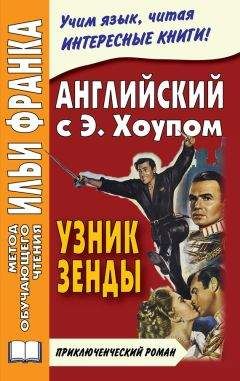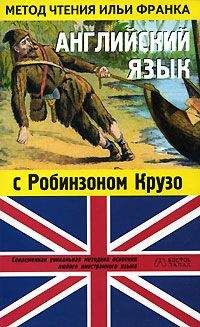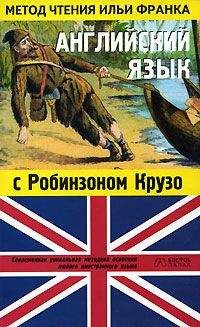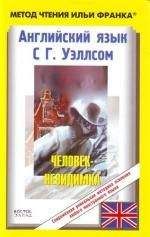Suddenly Fritz smote on his thigh (вдруг Фриц ударил себя по ноге: «по бедру»; to smite):
“But the guard! They’ll know! they’ll know (но /почетный/ караул! они узнают)!”
“Pooh! We shan’t wait for the guard (уф! мы не будем дожидаться караула). We’ll ride to Hofbau and catch a train there (мы поскачем в Хофбо и сядем там на поезд). When they come, the bird’ll be flown (когда они прибудут, птичка улетит; to fly).”
“But the King (а король)?”
“The King will be in the wine-cellar (король будет в винном погребе). I’m going to carry him there now (сейчас я собираюсь отнести его туда).”
“If they find him (а если они его найдут)?”
“They won’t (не найдут). How should they (как они /его найдут/)? Josef will put them off (Жозеф их спровадит; to put off – откладывать; отделываться).”
I obeyed him.
He darted from the room, calling “Josef! Josef!” In three minutes he was back, and Josef with him. The latter carried a jug of hot water, soap and razors. He was trembling as Sapt told him how the land lay, and bade him shave me.
Suddenly Fritz smote on his thigh:
“But the guard! They’ll know! they’ll know!”
“Pooh! We shan’t wait for the guard. We’ll ride to Hofbau and catch a train there. When they come, the bird’ll be flown.”
“But the King?”
“The King will be in the wine-cellar. I’m going to carry him there now.”
“If they find him?”
“They won’t. How should they? Josef will put them off.”
“But (но) – ”
Sapt stamped his foot (Сэпт топнул ногой; to stamp – ставить штамп; топать /ногами/).
“We’re not playing,” he roared (мы не /в игрушки/ играем, – прорычал он). “My God! don’t I know the risk (Боже мой! или я не понимаю, /что это/ риск)? If they do find him, he’s no worse off (если они действительно его найдут, ему не будет хуже; to do – делать, выполнять; употребляется для усиления) than if he isn’t crowned today in Strelsau (чем, если он не будет коронован сегодня в Стрелсо).”
So speaking, he flung the door open (говоря это, он настежь распахнул дверь; to fling open – распахнуть, раскрыть настежь; to fling – кидать, бросать; сделать быстрое, стремительное движение; open – открытый) and, stooping, put forth a strength I did not dream he had (и, нагнувшись, показал /такую/ силу, /о которой/ я и не помышлял, /что она/ у него есть; to put forth – напрягаться, прилагать усилия; to dream – видеть сны; думать, помышлять /в отриц. предложениях/), and lifted the King in his hands (и поднял короля на руки). And as he did so, the old woman, Johann the keeper’s mother, stood in the doorway (и когда он это делал, пожилая женщина, мать лесничего Иоганна, появилась: «стояла» в дверях). For a moment she stood, then she turned on her heel (она постояла с минуту, затем, круто повернувшись; to turn on one’s heel – круто повернуться; heel – пятка, пята), without a sign of surprise, and clattered down the passage (без признаков удивления, застучала /каблуками/ по коридору; to clatter – стучать, греметь; двигаться с грохотом).
“Has she heard?” cried Fritz (она слышала? – вскричал Фриц).
“I’ll shut her mouth!” said Sapt grimly (я заткну ей рот! – сказал Сэпт решительно; to shut – закрывать, затворять; grimly – жестоко, безжалостно; сурово, неумолимо), and he bore off the King in his arms (и вынес короля на руках).
“But – ”
Sapt stamped his foot.
“We’re not playing,” he roared. “My God! don’t I know the risk? If they do find him, he’s no worse off than if he isn’t crowned today in Strelsau.”
So speaking, he flung the door open and, stooping, put forth a strength I did not dream he had, and lifted the King in his hands. And as he did so, the old woman, Johann the keeper’s mother, stood in the doorway. For a moment she stood, then she turned on her heel, without a sign of surprise, and clattered down the passage.
“Has she heard?” cried Fritz.
“I’ll shut her mouth!” said Sapt grimly, and he bore off the King in his arms.
For me, I sat down in an armchair (что касается меня, то я сел в кресло), and as I sat there, half-dazed, Josef clipped and scraped me (и пока я сидел там, изрядно: «наполовину» ошеломленный, Жозеф стриг и скоблил меня) till my moustache and imperial were things of the past (пока мои усы и бородка не канули в прошлое: «не стали предметами из прошлого») and my face was as bare as the King’s (и лицо не стало таким же наголо /выбритым/, как у короля). And when Fritz saw me thus (и когда Фриц увидел меня таким) he drew a long breath and exclaimed (он сделал глубокий вдох и воскликнул; to draw breath – вздохнуть, перевести дыхание; long – длинный; долгий): – “By Jove, we shall do it (ей-богу, мы сделаем это; by Jove! – боже милостивый! вот те на!: «клянусь Юпитером»)!”
It was six o’clock now (сейчас было шесть часов), and we had no time to lose (и нам нельзя было терять ни минуты: «у нас не было времени, чтобы терять»). Sapt hurried me into the King’s room (Сэпт быстро отвел меня в комнату короля; to hurry – спешить, торопиться; поспешно уводить, отправлять), and I dressed myself in the uniform of a colonel of the Guard (и я переоделся в мундир полковника гвардии; uniform – форменная одежда, униформа), finding time as I slipped on the King’s boots to ask Sapt (найдя время, пока я натягивал королевские сапоги, спросить Сэпта; to slip on – накинуть, надеть; to slip – скользить, плавно или быстро передвигаться) what he had done with the old woman (что он сделал со старухой).
“She swore she’d heard nothing (она поклялась, что ничего не слышала),” said he; “but to make sure I tied her legs together (но для верности я связал ей ноги; to make sure – убедиться, удостовериться; together – вместе) and put a handkerchief in her mouth and bound her hands (сунул ей в рот носовой платок и связал руки; to bind), and locked her up in the coal-cellar, next door to the King (и запер ее в угольном подвале по соседству с королем; next – следующий; ближайший, соседний; door – дверь). Josef will look after them both later on (Жозеф позже присмотрит за ними обоими; to look on – наблюдать).”
Then I burst out laughing, and even old Sapt grimly smiled (тут я рассмеялся, и даже старик Сэпт мрачно улыбнулся; to burst out doing smth. – давать выход чувствам, внезапно или бурно начинать что-л.; to burst – взрываться, разрываться).
For me, I sat down in an armchair, and as I sat there, half-dazed, Josef clipped and scraped me till my moustache and imperial were things of the past and my face was as bare as the King’s. And when Fritz saw me thus he drew a long breath and exclaimed: —
“By Jove, we shall do it!”
It was six o’clock now, and we had no time to lose. Sapt hurried me into the King’s room, and I dressed myself in the uniform of a colonel of the Guard, finding time as I slipped on the King’s boots to ask Sapt what he had done with the old woman.
“She swore she’d heard nothing,” said he; “but to make sure I tied her legs together and put a handkerchief in her mouth and bound her hands, and locked her up in the coal-cellar, next door to the King. Josef will look after them both later on.”
Then I burst out laughing, and even old Sapt grimly smiled.
“I fancy,” said he, “that when Josef tells them the King is gone (я полагаю, – сказал он, – когда Жозеф скажет им, что король уехал; to fancy – воображать, представлять себе; предполагать, полагать) they’ll think it is because we smelt a rat (они подумают, это потому, что мы почуяли недоброе: «почуяли крысу»; to smell – обонять, чувствовать запах; чуять). For you may swear Black Michael doesn’t expect to see him in Strelsau today (потому что, можете поклясться, Черный Михаэль не ожидает увидеть его сегодня в Стрелсо).”
I put the King’s helmet on my head (я надел шлем короля себе на голову). Old Sapt handed me the King’s sword (cтарина Сэпт протянул мне королевский меч), looking at me long and carefully (смотря на меня долгим и внимательным /взглядом/).
“Thank God, he shaved his beard!” he exclaimed (слава Богу, он сбрил свою бороду).
“Why did he?” I asked (почему он это сделал? – спросил я).
“Because Princess Flavia said he grazed her cheek (потому что принцесса Флавия сказала, что он царапает ей щеку; to graze – содрать, натереть /кожу/) when he was graciously pleased to give her a cousinly kiss (когда он милостиво соизволил поцеловать ее по-родственному; to please – радовать, доставлять удовольствие; соизволить, соблаговолить; cousin – кузен, кузина; родственник). Come though, we must ride (однако же, пойдемте, нам нужно ехать).”
“Is all safe here (а здесь все благополучно; safe – безопасный; благополучный)?”
“Nothing’s safe anywhere,” said Sapt, “but we can make it no safer (нигде ничто не благополучно, – сказал Сэпт, – но мы не можем этого поправить: «сделать это благополучнее»).”
Fritz now rejoined us in the uniform of a captain (тут к нам присоединился Фриц в форме капитана) in the same regiment as that to which my dress belonged (того же полка, которому принадлежал и мой мундир: «моя одежда»). In four minutes Sapt had arrayed himself in his uniform (через четыре минуты Сэпт облачился в свою форму; to array – строить /войска/; одевать, облачать). Josef called that the horses were ready (Жозеф крикнул, что лошади готовы). We jumped on their backs and started at a rapid trot (мы вскочили в седла: «на их спины» и пустились быстрой рысью). The game had begun (игра началась). What would the issue of it be (каким будет ее итог)?
“I fancy,” said he, “that when Josef tells them the King is gone they’ll think it is because we smelt a rat. For you may swear Black Michael doesn’t expect to see him in Strelsau today.”
I put the King’s helmet on my head. Old Sapt handed me the King’s sword, looking at me long and carefully.
“Thank God, he shaved his beard!” he exclaimed.
“Why did he?” I asked.
“Because Princess Flavia said he grazed her cheek when he was graciously pleased to give her a cousinly kiss. Come though, we must ride.”
“Is all safe here?”
“Nothing’s safe anywhere,” said Sapt, “but we can make it no safer.”
Fritz now rejoined us in the uniform of a captain in the same regiment as that to which my dress belonged. In four minutes Sapt had arrayed himself in his uniform. Josef called that the horses were ready. We jumped on their backs and started at a rapid trot. The game had begun. What would the issue of it be?
The cool morning air cleared my head (/от/ прохладного утреннего воздуха мои мысли прояснились: «прохладный утренний воздух очистил мою голову»), and I was able to take in all Sapt said to me (и я стал способен усваивать все, что говорил мне Сэпт; to take in – принимать; понять, усвоить). He was wonderful (он рассказывал удивительные вещи: «он был удивительным»). Fritz hardly spoke, riding like a man asleep (Фриц в основном молчал: «почти не говорил» и скакал, как во сне: «как спящий человек»), but Sapt, without another word for the King (но Сэпт, ни словом не упоминая о короле; without another word – не говоря ни слова), began at once to instruct me most minutely in the history of my past life (принялся: «начал» сразу же рассказывать во всех деталях: «наиболее подробно» о моей прошлой жизни; to instruct – учить, обучать; информировать, сообщать; history – история; прошлое), of my family (о моей семье), of my tastes (моих вкусах), pursuits (занятиях; pursuit – преследование, погоня; занятие), weaknesses (пристрастиях: «слабостях»; weak – слабый), friends (друзьях), companions (товарищах /ср. компаньон/), and servants (и слугах). He told me the etiquette of the Ruritanian Court (он рассказал мне об этикете Руританского двора), promising to be constantly at my elbow (обещая быть неотступно: «постоянно» рядом; at one’s elbow – рядом, под рукой; elbow – локоть) to point out everybody whom I ought to know (чтобы указывать на каждого, кого я должен знать), and give me hints with what degree of favour to greet them (и давать подсказки, с какой степенью благосклонности = насколько благосклонно приветствовать их; hint – намек; совет).





